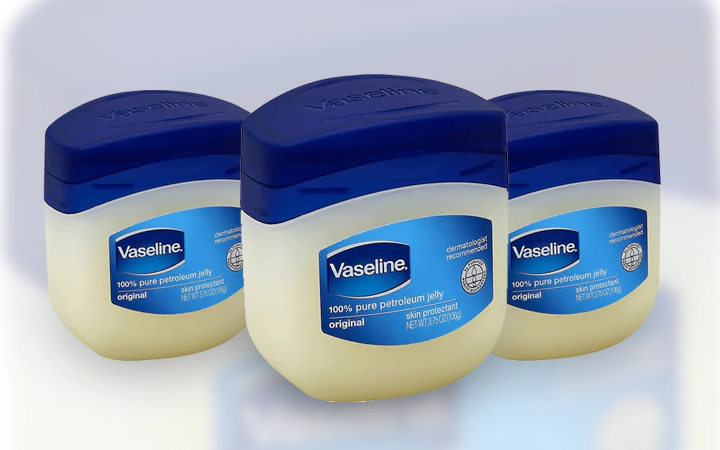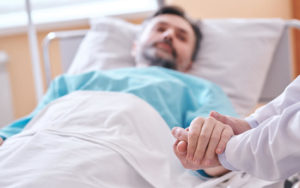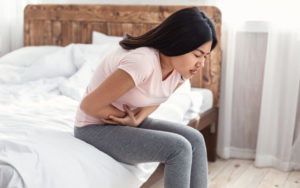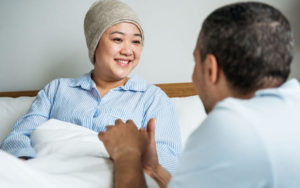Colon cancer is a type of cancer in which malignant cells form in the tissues of the colon.
The colon is part of the body’s digestive system. The digestive system processes and removes nutrients, fats, proteins, vitamins, minerals, and water from foods and helps pass waste material out of the body.
The digestive system is composed of the esophagus, stomach, and the small and large intestines.
The colon is the first part of the large intestine and is approximately 5 feet long. Together, the rectum and anal canal make up the last part of the large intestine and are approximately 6 to 8 inches long. The anal canal ends at the anus.
Gastrointestinal stromal tumors can form in the colon.
Typically, colon cancer affects older adults, though it can affect people of all ages. It typically starts as small, benign (noncancerous) clumps of cells known as polyps that form inside the colon. Over time, some of these polyps can become colon cancers.
Polyps may be small and produce few, if any, symptoms. Because of this, doctors recommend regular screening tests to help prevent colon cancer by identifying and removing polyps before they turn cancerous.
If colon cancer develops, there are numerous treatments available to help control it.
In this article, we discuss everything you need to know about colon cancer, including its signs and symptoms, risk factors, prevention, and treatment options.
Signs and Symptoms of Colon Cancer
In the earliest stages, colon cancer often causes no symptoms. However, as the disease progresses, its symptoms may become more noticeable. Some of the signs and symptoms of colon cancer include:
- Fatigue or weakness
- Constipation or diarrhea
- Unexplained weight loss
- Loose, narrow stools
- Changes in stool consistency
- Iron deficiency anemia
- Blood in the stool
- Rectal bleeding
- Irritable bowel syndrome
- A feeling that the bowel does not empty all the way
- Persistent abdominal discomfort, such as gas, bloating, or cramps
Symptoms may vary from one person to another, depending on the size of the cancer and its location in your large intestine.
Furthermore, if the cancer spreads to a new part in the body (i.e. liver) it can cause new symptoms in the new area.
When to see a doctor
If you notice any sudden or persistent symptoms that worry you, consult your doctor. Ask your doctor about when you can start colon cancer screening. Generally, guidelines recommend that colon cancer screenings start around 50. However, your doctor may recommend earlier or more frequent screening if you have other risk factors, such as a family history of colon cancer.
Colon Cancer Stages
The following stages are used for colon cancer:
- Stage 0 (Carcinoma in Situ). At this stage, the cancer is in its earliest stage. It has not grown farther than the colons’ inner layer and is usually easy to treat.
- Stage 1. At this stage, the cancer has grown into the next layer of tissue but hasn’t spread to the lymph nodes or other organs yet.
- Stage 2. At this stage, the cancer has reached the colons’ out layers, but it has not spread beyond the colon yet.
- Stage 3. At this stage, the cancer has grown through the colons’ outer layers and has reached one to three lymph nodes. However, it has not spread to other organs yet.
- Stage 4. At this stage, the cancer has reached other tissues beyond the colon’s walls. As it progresses, colon cancer reaches distant body parts as well.
Risk Factors
Anything that increases your chances of getting cancer is known as a risk factor. However, take note that having a risk factor does not mean that you will automatically get cancer; and that not having a risk factor does not mean that you will not get cancer.
Risk factors for colon cancer include:
- Having a family history of colon cancer in a first-degree relative (i.e. parent, sibling, or child)
- Having a personal history of cancer of the ovary, colon, or rectum
- Having inflammatory intestinal conditions, such as Crohn disease or ulcerative colitis
- Having inherited syndromes that increase colon cancer such as Lynch syndrome (hereditary non-polyposis colorectal cancer) or familial adenomatous polyposis (FAP)
- A sedentary lifestyle
- A low-fiber, high-fat diet
- Obesity
- Smoking
- Heavy alcohol use
Causes of Colon Cancer
The exact cause of colon cancer is not known, but certain risk factors – such as those listed above – can increase your chances of developing the disease.
Generally, colon cancer starts when healthy cells in the colon develop mutations in their DNA. When a cell’s DNA is damaged and becomes cancerous, cells continue to divide – even when new cells are not required. As these cells accumulate, they form a tumor. Over time, these cancer cells can grow, invade, and destroy normal tissues nearby. Furthermore, these cancerous cells can travel to other body parts.
How to Prevent Colon Cancer
Looking to lower your risk of developing colon cancer? Here are 5 tips to keep in mind.
- Get Screened
Getting regular colon cancer screening tests is the single best way to protect you from this disease. With screenings, it is possible to catch cancer early, when it is most treatable. Most people should start getting colon cancer screening at age 50; however, some guidelines recommend age 45. People with a family history of colon cancer and other risk factors may get screened even younger and get test more frequently.
There are several effective screening tests for colon cancer – each with its own advantages and disadvantages. Consult your doctor about your options, and together, you can decide which screening test is best for you. - Maintain a Healthy Weight
Being overweight is one of the major risk factors for different types of cancer – about 11 different cancers have been linked to weight gain and obesity, including colon cancer. If you find yourself gaining weight, the first goal is to stop gaining more weight – this has health benefits by itself. Then, continue to maintain a healthy weight by eating healthier and increasing your physical activity. - Maintain a Healthy Colon
A healthy colon basically functions as the “cleanup” crew of the body. So it is really a must to maintain a healthy colon to serve as your first line of defense to get rid of colon cancer.
Having said that, and to over-emphasized this piece of advice, everyone needs to have a regular
colon cleansing to prevent any unwanted risk of colon health issues.
Colon cleansing, also known as colonic irrigation or colonic hydrotherapy, involves flushing the colon with fluids to remove waste. It’s a practice that’s been around since ancient times, and the benefits are based on the premise that digestive waste can be a toxin to the body.
There are few ways to colon cleanse. You can purchase a colon-cleansing product, or you can even get a colonic irrigation or enema. Otherwise, you can do simple things to boost or “cleanse” your colon naturally at home. The following natural colon cleansers can be done cheaply, and they’re also quite safe if done correctly.
Water Flush
Drink plenty of water and staying hydrated is a great way to regulate digestion. People who support a water flush for colon cleansing recommend drinking six to eight glasses of lukewarm water per day.
High-Fiber Diet
Load up on fruits, vegetables and whole grain fiber. Fruits and veggies are high in antioxidants, while fiber promotes regular bowel movements. Fiber is an essential macronutrient often overlooked in the diet. It’s found in whole, healthy plant foods like fruits, vegetables, grains, nuts, seeds, and more.
Juices
Juices are very popular colon cleansers. These include fruit and vegetable juices that cleanse your colon fast like master colon cleansers. However, if you have no time of doing it yourself, you can simply order a proven natural colon cleansing product online like TOCOMA – a Total Colon Management specifically produced and manufactured for total colon cleansing purposes in a powdered form, which you mix with water to make a refreshing fiber juice drink. - Exercise Regularly
If you live a sedentary lifestyle, you may have a greater chance of developing serious diseases, including colon cancer. If you want to reduce your risk of developing this disease, make sure to stay active.
Any amount of physical activity is always better than none, but experts recommend staying active for at least 30 minutes or more each day. To help you stay motivated, choose activities that you enjoy – be it dancing, cycling, running, swimming, or something else. - Limit Red Meats and Processed Meats
Eating too much red meats such as pork and steak, can increase your risk of developing colon cancer. Moreover, processed meat, such as sausage and bacon, can increase your risk even more.
Make sure to limit your intake of red and processed meats – try to eat no more than 3 servings each week; less is even better. - Limit Alcohol
Alcohol intake has been linked with a higher risk of developing colorectal cancer. The American Cancer Society recommends no more than 1 drink a day for women and 2 drinks a day for men. A single drink amounts to 1½ ounces of hard liquor, 5 ounces of wine, or 12 ounces of beer
Colon Cancer Treatment
There are different types of treatment available for patients with colon cancer. Some of these treatment methods include:
- Surgery. Surgery is the most common treatment for all stages of colon cancer. A doctor may remove the cancer using different surgery methods, such as local excision, resection of the colon with anastomosis, or resection of the colon with colostomy.
- Chemotherapy. Chemotherapy uses drugs to stop the growth of cancer cells, either by stopping them from dividing or by killing the cells.
- Radiation Therapy. Radiation therapy involves the use of high-energy x-rays or other types of radiation to stop cancer cells from growing to kill them. There are two types of radiation therapy, internal radiation therapy and external radiation therapy.
- Radiofrequency Ablation. Radiofrequency ablation involves using a special probe with small electrodes to kill cancer cells. Sometimes, the probe is directly inserted through the skin. In other cases, the probe is inserted through an incision in the abdomen.
- Immunotherapy. Immunotherapy is a type of treatment that uses the patient’s own immune system to fight cancer. Substances made by the body or developed in a lab are used to restore or boost the body’s natural defenses against cancer.
- Clinical Trials. For some cancer patients, taking part in a clinical trial may be the best treatment option. Patients can enter a clinical trial before, during, or after starting their cancer treatment. Some clinical trials only admit patients who haven’t received treatment yet; while others test treatments for patients whose cancer hasn’t gotten better. Clinical trials take place in many parts of the world. Clinical trials are supported by organizations and private institutions.
Colon Cancer Survival Rate
For colon cancer, the overall 5-year survival rate for patients is about 63%. If the cancer has spread to the regional lymph nodes and/or surrounding tissues or organs, the 5-year survival rate is about 71%.
If the cancer is diagnosed at a localized stage, the survival rate is 90%.
Conclusion
Colon cancer is a type of cancer in which malignant cells form in the tissues of the colon. It is one of the most common cancers around the world.
The exact cause of colon cancer is not known, but certain risk factors – such as a family history of the disease, obesity, smoking, and heavy alcohol use – can increase your chances of developing the disease.
There are different ways to prevent colon cancer, including regular exercise, limiting alcohol intake, smoking cessation, limiting red meats and processed meats intake, and getting regular colon cancer screenings.
There are different types of treatment available for patients with colon cancer.
Some of these treatments include surgery, chemotherapy, radiation therapy, and clinical trials. Consult your doctor for the best treatment option that best suits your needs.
However, among all these treatment options that are being discussed, still, Prevention remains to be better than cure. Maintaining a healthy colon can help you prevent a possible risk of having colon cancer.

One of the best and natural ways of having a healthy colon is through a regular and natural colon cleansing.
This can be done by eating a high-fiber diet, drinking plenty of water and juices, mixed with proven natural colon cleansing product in powdered form, one of which is TOCOMA – a Total Colon Management product specifically produced and manufactured for total colon cleansing purposes









